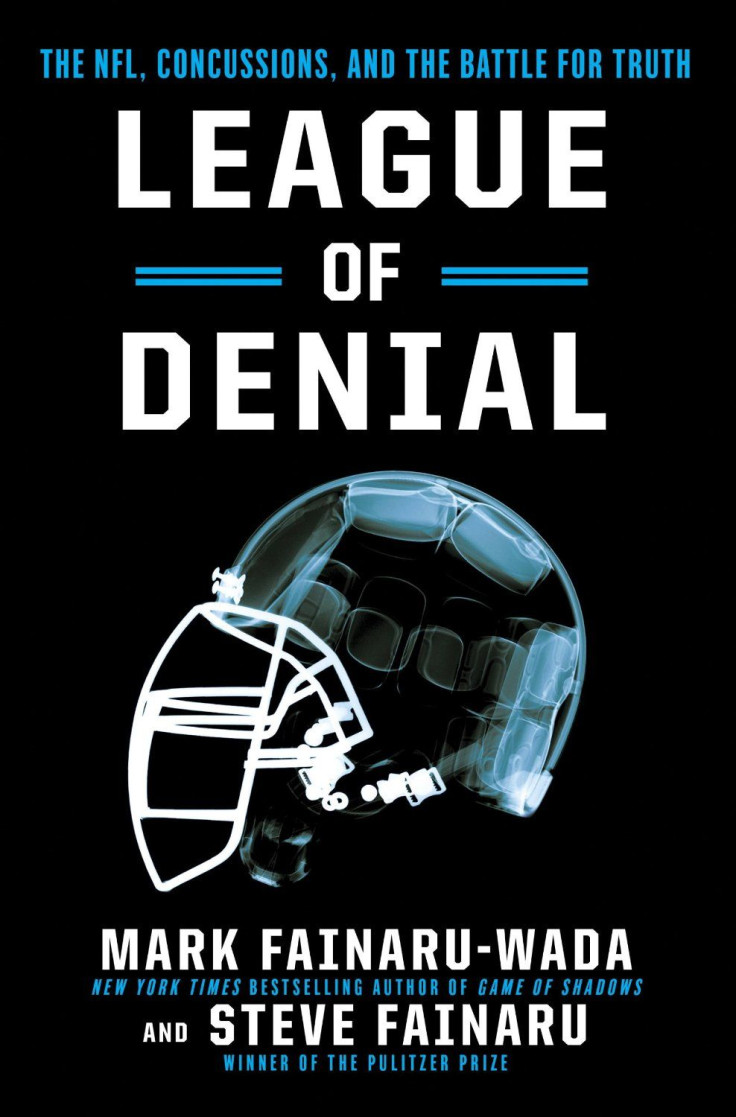New Book, 'League Of Denial,' Exposes 2 Decades Of NFL Minimizing Link Between Football, Concussions, And Brain Damage

Soon after the National Football League’s (NFL) $765M settlement on Aug. 29 over concussion-related brain injuries suffered by 18,000 retired football players, the league has found itself under fire once again. Excerpts released from a new book about the league’s management of safety and health concerns reveal two decades' worth of lies and deception.
League of Denial: The NFL, Concussions and the Battle for Truth is written by ESPN investigative reporters Mark Fainaru-Wada and Steve Fainaru. Excerpts released on Wednesday by ESPN The Magazine show the NFL tampering with scientific evidence by discrediting the work of independent scientists who had highlighted the detrimental health risks that concussions pose to athletes, especially football players. Disregarding scientific research, the league has been caught red-handed citing scientific data that is flawed and biased under Paul Tagliabue, the former NFL commissioner, ESPN reports.
In 1994, Tagliabue created the Mild Traumatic Brain Injury (MTBI) committee to act as the league’s concussions investigatory committee. According to the excerpt, the committee published its controversial research in the medical journal, Neurosurgery, and the piece was edited by a New York Giants consultant, Dr. Michael Apuzzo. The reporters commented that Apuzzo, a neurosurgeon consultant, was a “sports guy wannabe” who would brag about having lunch with the former NFL commissioner and was just excited to stand on the sidelines during football games.
The studies published in Neurosurgery by Apuzzo had conclusions that left many in the medical field apprehensive. The ESPN investigative reporters revealed that Apuzzo would ignore the peer-reviewers’ objections to the league research and would immediately rush to rubber-stamp it in the journal. Scientists soon scorned the puzzling research and ridiculed the journal as "The Official Medical Journal of the National Football League" and the "Journal of No NFL Concussions.” Concussions were discussed as minor injuries, multiple concussions were not linked to an increased risk of further injury, and football was not seen as a potential risk factor for brain damage under the conclusions of Apuzzo.
According to the Centers for Disease Control and Prevention (CDC), all concussions are serious, and most of them occur without the loss of consciousness. Athletes who have experienced a concussion are at an increased risk for another concussion. The reoccurrence of concussions can result in brain swelling, permanent brain damage, and even death.
A small group of scientists who refuted Apuzzo’s findings decided to take matters into their own hands and came up with research data showing that concussions are, in fact, detrimental to football players’ health. “The essence of football — the unavoidable head banging that occurs on every play, like a woodpecker jackhammering at a tree — can unleash a cascading series of neurological events that in the end strangles your brain, leaving you unrecognizable,” reads an excerpt from the book.
This research was presented to NFL executives in hopes that they would reevaluate and look out for the health and safety of their players. Instead, the league decided to conceal the evidence by exerting its economic, political, and media power and replacing the research with their own.
After Tagliabue left in 2006, Roger Goodell, the current NFL commissioner, started to slowly acknowledge the possible and serious health outcomes of brain injuries. In 2010, the NFL decided to become a contributor to concussion research by donating $1 million to Boston University, reports ESPN. BU was seen as the league’s “preferred brain bank.” Families of retired players were encouraged to donate the brains of former players for research. However, when BU researchers found a connection between the deaths of former San Diego Chargers linebacker Junior Seau and other multiple former players, the league decided to distance itself from BU and donate $30 million to the National Institutes of Health (NIH), instead.
The NIH supported BU’s claim and announced Seau tested positive for chronic traumatic encephalopathy (CTE), a chronic brain condition that has also been documented in the brains of 50 deceased football players, including 33 who played in the NFL, ABC News reports. CTE is thought to be the result of repeated concussions and can lead to dementia, memory loss, and depression.
Seau’s ex-wife, Gina, told ABC News and ESPN that researchers informed her Seau’s disease was caused by “a lot of head-to-head collisions over the course of 20 years playing in the NFL … And that it gradually, you know, developed the deterioration of his brain and his ability to think logically.”
“Football's health crisis featured not millions of anonymous victims but very public figures whose grotesque demises seemed almost impossible to reconcile with their personas," the Fainaru brothers wrote in their book.
League of Denial will be published on Tuesday by Crown Archetype.



























